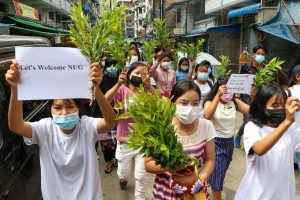Since the February 1 coup in Myanmar, the military has unfurled a brutal nationwide crackdown targeting protesters and civilians who oppose their unlawful rule. Indeed, last week’s stinging rebuke of the military coup by the United Nations General Assembly — only the fourth such resolution since the end of the Cold War — offers a stark reminder of what’s at stake.
Two opposing bodies have been formed in the coup’s wake. The military junta’s State Administration Council (SAC), ruling with savagery and corruption, and the National Unity Government (NUG), established by the duly elected lawmakers whose parliament was overthrown. It includes representatives from a diverse array of pro-democracy movements, organizations, and parties, and has impressively challenged the military junta with a vision for a democratic, federal union.
Given years of systematic disenfranchisement by the military and the civilian-led government, the Rohingya Muslim community has eagerly awaited the NUG’s position on the rights of the Rohingya. The signs so far are promising: Earlier in June, it acknowledged past abuses, pledging to replace discriminatory laws and work to bring the million-plus Rohingya refugees home.
As a member of the Rohingya community and an advocate for human rights for all, I am encouraged by these steps, but they should be considered a floor, not a ceiling. Citizens of Myanmar and members of the international community should press the NUG to capitalize on this landmark juncture — in which members of the country’s ethnic and religious communities are rising up together against the military’s violence and repression — to fully guarantee that Rohingya, as well as all other ethnic nationalities, will be entitled to rights as both individual citizens and as a group. This is critical for building a truly democratic Myanmar, where all peoples can live free from violence, discrimination, and abuse.
The military has long pitted ethnic groups against one another, and we have all suffered because of it. Every time a Kachin village is bombed, a Mon child denied the right to learn their native tongue, a Kaman fisherman refused his livelihood, a Karen woman raped, a Rohingya village burned down, a Hindu teenager denied an identity card, we are all harmed.
The NUG said it would repeal the 1982 Citizenship Law, which only grants full citizenship to certain ethnic groups, and replace it with a law that grants citizenship based on birth within the country, or to parents who are already citizens. The pernicious 1982 law pushed the Rohingya into legal limbo, effectively blocking our rights to education, livelihoods, and freedom of movement.
I cannot emphasize this enough: The National Unity Government is not bestowing citizenship on the Rohingya. Rohingya have been citizens of Myanmar since its very founding. Rohingya were involved in drafting the original constitution and have served in elected and civil service positions throughout the country’s history. Rohingya, as members of parliament, doctors, teachers, politicians, farmers, business owners, activists, and more, have been an integral part of Myanmar’s development.
Contrary to what many believe, the 1982 Citizenship Law did not automatically strip Rohingya of citizenship. Even under this discriminatory law, Rohingya qualified and could have been recognized as an “ethnic nationality.” It is the military that helped perpetuate the corrosive lie that Rohingya were not an “ethnic nationality” and therefore not deserving of the rights of humans, let alone citizens.
This racist fiction helped others in Myanmar ignore, and even encourage, persecution and violence, culminating in the military’s genocidal campaigns against the Rohingya in 2016 and 2017, which left thousands dead and displaced hundreds of thousands into Bangladesh.
It is more important than ever for the NUG to recognize Rohingya as an ethnic nationality, entitled to rights both as individual citizens and as a group, which it could do now, even under the existing law. To do so would show that the NUG is serious about creating a truly inclusive, truly democratic, truly federal multiethnic union.
We need to work together to hold the military responsible for human rights abuses so that we can break the cycle of violence and discrimination. The NUG has already acknowledged the need to address past abuses against the Rohingya, promising to initiate a process before the International Criminal Court “if necessary.” But the military has used brutal tactics on other minorities, too. The NUG should thus ensure effective remedy and repair for all communities in Myanmar, integrating recommendations from the U.N. Independent Fact-Finding Mission on Myanmar.
The NUG’s commitment to a “voluntary, safe, and dignified repatriation of Rohingya” from neighboring countries is encouraging, but it should also outline how this promise will be realized. Rohingya do not want special treatment, merely equal treatment and for past wrongs to be righted.
Repatriation needs to include the option to return to their homes and places of origin and compensation for destruction and injuries suffered. Rohingya should not be forced into segregated camps or villages, which will only perpetuate apartheid conditions in Rakhine State. As victims of genocide, Rohingya will also need protection from discrimination, harassment, and abuse by security forces, government officials, and the broader community.
Most important, we need to have a say in the future of our country. So far, the NUG has shown good faith in consulting Rohingya in developing its positions, but consultation is not enough.
No group of people in Myanmar should be dependent on anyone else determining whether they are worthy of basic rights. The NUG should include meaningful Rohingya representation in the National Unity Consultative Council, in the committees and conventions tasked with drafting the constitution, and in all future government bodies.
Rohingya have time and again demonstrated their opposition to the military’s violence and human rights abuses. We stand ready to work with all other ethnic communities to make a stronger, better Myanmar.
We will never be free until all of us are free.

































